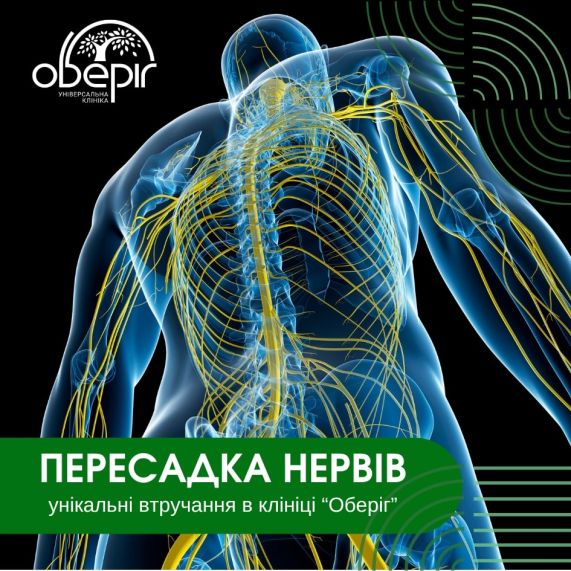Nerve transplantation - operations for limb damage in Kyiv
13 August 2024


13 August 2024


Nerve transplantation — operations for limb damage in Kyiv
Nerve transplantation, or autotransplantation of peripheral nerves, is a modern method of nerve reconstruction that requires not only the skill of the operating surgeon but also the use of innovative technologies. For example, the use of adipose tissue-derived multipotent stromal cells (AT-MSCs), plasma growth factors, etc.
The essence of the nerve transplant operation is to isolate the healthy nerve fibers and transplant them to the desired area without causing functional disturbances in the donor area.
In the "Oberig" clinic, nerve autotransplantation operations are performed by Andrii Laslovych Petah, a plastic surgeon with 25 years of experience and a candidate in medical sciences. He led a multidisciplinary team of specialists, which achieved a positive result in treating peripheral nerve damage.
When nerve autotransplantation surgery is indicated
Nerve damage with loss of motor functions (limb movement, facial expressions) as a result of household injuries, road accidents, mine-explosive, and other types of combat injuries.
Examination before nerve autotransplantation surgery
Clinical-instrumental diagnostics include a patient's physical examination with a list of general laboratory tests and instrumental examinations (vascular Doppler, angiography, ultrasound), among which ultrasound of the nerves is critical. Together with a neurologist, an ultrasound doctor, and a vascular surgeon, the plastic surgeon assesses the state of the damaged nerve and the state of the adjacent tissues and determines the possibility of reconstructive neurosurgical intervention.
Preparation for nerve transplant surgery
In the period of preparation for the nerve transplant operation, the patient must undergo a rehabilitation program, the purpose of which is to restore passive movements in the limbs. Only if the patient has regained passive movements in the limb does the result of the nerve autotransplantation operation prognostically have a chance of success. This is because the muscle to which the nerve grows must be "alive" and functional (i.e., able to contract/relax). Neurologists and specialists in rehabilitation medicine are involved in this stage of training.
Results of nerve autotransplantation surgery and recovery times
You should not expect an immediate result after nerve transplant surgery — the nerve tissue has its speed of recovery: on average, the nerve grows 1 mm per day or 3 cm per month. By measuring the distance, the nerve must grow with a ruler, we have approximate terms for restoring the limb's function. However, in the first days after the nerve transplant operation, the appearance of some symptoms (such as a feeling of tingling in the operated area and being below the level of the operation, for example) indicates the beginning of nerve recovery.
Why should you contact "Oberig" regarding damage to peripheral nerves
The "Oberig" clinic has accumulated significant successful experience performing peripheral nerve operations. However, almost every second intervention is a challenge because the nature and mechanism of injuries received by patients today are unique and complex. According to the operating plastic surgeon of the "Oberig" clinic, Andrii Petah, "There are hopeless situations, but they are not for us — we use even the smallest chance to help the patient return the lost functions of the limbs in case of peripheral nerve damage. In addition, an integral and exclusive benefit of nerve transplantation operations at the "Oberig" clinic is the use of innovative technologies, such as MSCs and plasma growth factors, which increase the quality of the results many times over.
Prepared by the press service
universal clinic "Oberig"